
You are logged in as
Logout
You are logged in as
LogoutThis website uses cookies to distinguish you from other users. This helps us to provide you with a good user experience and also allows us to improve our website. More information

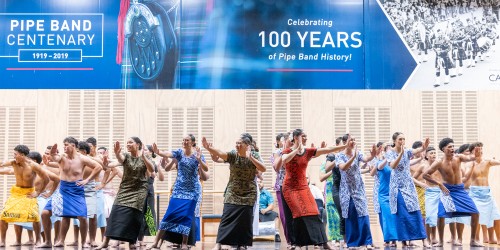 We are privileged to have such a beautiful campus. As a member of the College family, it is expected that students will respect all areas of the campus, including classrooms, gardens and buildings.
We are privileged to have such a beautiful campus. As a member of the College family, it is expected that students will respect all areas of the campus, including classrooms, gardens and buildings.
Students are responsible for their own property. They are advised against bringing valuables and money to school. They should ensure that clothing and belongings are named, and lockers are kept locked. Prevention is the best policy, as recovery of stolen items is unlikely in many cases. Students should also treat others' property with respect and hand in anything they find to the Senior College Office.
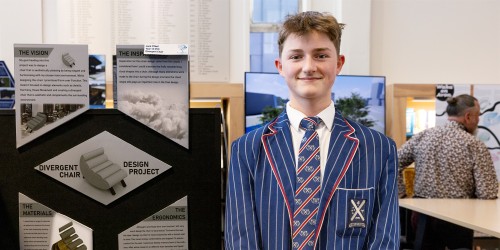 The objective of this department is to assist students to make decisions at key transition points and supports their successful transition from school to further education or work. It also aims to develop the career management competencies which will equip students to manage their career pathways and opportunities throughout their lives.
The objective of this department is to assist students to make decisions at key transition points and supports their successful transition from school to further education or work. It also aims to develop the career management competencies which will equip students to manage their career pathways and opportunities throughout their lives.
Both the Careers Room and the Pathways classroom are based in the Senior College.
Careers Counsellor
Mr Richard Webster
RWB@stac.school.nz
The College acknowledges the role cellphones and smart watches play in personal security. The following conditions apply, and are non-negotiable:
Inappropriate use of cellphones / smart watches will result in their immediate confiscation. The cellphone /smart watch will be held in the Senior College Office throughout the day for a period of time at the Head of Senior College’s discretion, normally not less than two days.
Full details of the College’s Personal Digital Devices Policy can be found here.
The College takes no responsibility for the security of student personal digital devices and they should be covered by their own insurance.
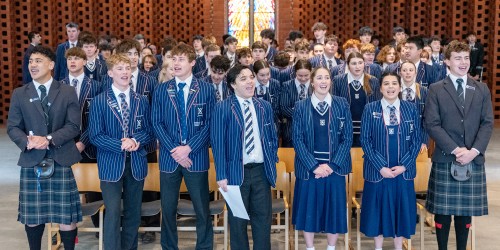 St Andrew’s College is firmly founded on Christian principles, and worship in chapel is a central feature of life in the College community. Our College motto, ‘Fides et Patria’ (Faith and Country), presents us with a special challenge as we seek to encourage our students to know and love God, and to serve others within and beyond our College community.
St Andrew’s College is firmly founded on Christian principles, and worship in chapel is a central feature of life in the College community. Our College motto, ‘Fides et Patria’ (Faith and Country), presents us with a special challenge as we seek to encourage our students to know and love God, and to serve others within and beyond our College community.
Senior College students and staff attend a weekly service in the Centennial Chapel. The services are led by the College Chaplain, Rev. Paul Morrow, and Assistant Chaplain, Mr Ben Hughes.
Sunday evening chapel takes place three times a year. Attendance is compulsory and we invite families to join students for these special services. If a Sunday chapel service is missed, there will be alternative chapel services offered as catch up. Chapel services are marked on the term fixtures.
Chapel features in our life in these ways:
If you receive an injury to your head or impact to your body, you may have sustained a concussion. With rest and gradual return to school and sports, these usually resolve quickly.
You must report any concussion to the College Nurse or Concussion Officer as soon as possible. After an incident, it is important to visit a doctor, who will assess whether you have concussion.
During the first 48 hours, it is important to rest your brain and body. That means staying home from school, walking around the house if that does not make the pain or symptoms worse, and:
The more you rest during this time, the faster the recovery and return to normal.
Book a doctor's appointment as soon as possible, to be assessed or cleared of concussion.
If any of the following symptoms occur, inform your parent/caregiver and contact your doctor for advice. If symptoms worsen, it is important to get immediate medical care – this could indicate a more serious injury:
It is important not to ignore these symptoms, as this will delay recovery.
After 48 hours, you can begin the Gradual Return to Learn process. The College will support you through the Return to Lean process and manage your school workload and any assessments or commitments.
Your year level Dean will make a plan and communicate with school staff on your behalf. Make sure you see your doctor before returning to full sport training, particularly for contact training. Take care of your mental health during recovery; it is normal to find this recovery hard. Talk to your parents/caregivers/coaches/friends and ask for help if you need it.
To optimise navigation in digital and technological spaces, students are encouraged to familiarise themselves with our Cyber Safety information to gain awareness of potential risks and corresponding risk mitigation strategies.
Please see the links below for these resources:
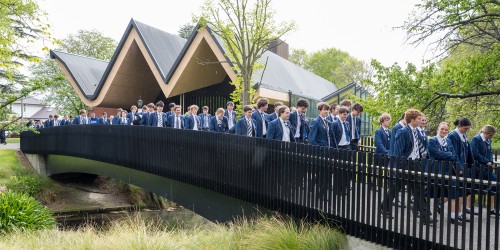 The Senior College week in periods:
The Senior College week in periods:
Year 12 (29 periods)
24 Academic (1 compulsory subject (English) 4 periods / week, 5 self-chosen subjects 4 periods / week)
1 Chapel
1 Religious Education
1 Physical Education
1 Study (supervised) (to include eight-week semester course on Leadership)
1 Vocational Recreational (Monday Period 6)
Year 13 (29 periods)
20 Academic (5 self-chosen subjects 4 periods / week)
1 Chapel
1 Life Skills + Study (1 semester)
1 Physical Education + Religious Education (1 semester)
4 Study (unsupervised)
1 Focus (Monday Period 1)
1 Vocational Recreational (Monday Period 6)
There are 28 classroom periods scheduled each week. Commitments will vary however, depending on involvement in vocational, recreational (options), Religious Education, Physical Education, Life Skills or study. Most Year 12 students are in class for 28 periods a week and Year 13 students up to 24 periods. Timetables will be unique to each student and are approved by Deans.
Year 13 study periods are on site and are to be used for academic study or quiet down time. They are not to be used for sports coaching, personal fitness sessions or cultural practices / rehearsals. If study periods are used inappropriately, students may be asked to attend supervised study or to study in an allocated room.
Tutor group meetings are held daily on Monday to Thursday (for an extended time). On Fridays where there is no full assembly, there may be either a Senior College assembly run by the Head of Senior College or a Deans’ meeting with the relevant year groups. These will run from 8.25am–8.55am, followed by a six period teaching day.
Lunchtime is at 12.35pm each day and the Cafeteria is open before school, at morning interval and at lunchtimes.
The Electives Programme runs on Mondays during Period 6. It is compulsory for all Year 13 students. Courses last an average of six weeks. Most are based at the College, but some are held elsewhere. Some courses are free of charge, while others charge a fee. Each student is required to complete three courses during the year. Information about signing up for Electives will be provided in advance of each term, and signing-up is completed online.
Year 12 students will be timetabled to take part in a new Life Skills course from 2024. This will involve three modules, delivered in Terms 1, 2 and 3, comprising Strengths-Based Leadership, Careers Pathway training, and Financial Literacy.
Parents do not have to wait until official evenings to see us. Our staff, including Deans, counsellors and senior administrators, are available to discuss your child’s progress.
A Senior College Leadership booklet providing details of these opportunities is distributed to students in Term 2. The handbook provides information on the qualities, key tasks and application, appointment and feedback processes for all leadership positions, including: Prefects, Senior College Council, Heads of Boarding, Peer Support, Community Leaders, Sacristans and Captains of Culture, Sport and Academia.
Senior students will generally be offered a maximum of two leadership positions in any one year, to prevent over-commitment.
|
Position |
Year 12 |
Year 13 |
|
College Prefect |
|
✓ |
|
Heads of Boarding |
|
✓ |
|
Academic Captains |
|
✓ |
|
Cultural Captains |
|
✓ |
|
Senior College Council |
✓ |
✓ |
|
Peer Support Leaders |
✓ |
✓ |
|
Sports Captains |
|
✓ |
|
Sports Council |
✓ |
✓ |
|
House Leaders |
✓ |
✓ |
|
International Exchange Leaders |
✓ |
✓ |
|
Heads of International Culture |
✓ |
✓ |
|
Heads of Māori and Pasifika |
✓ |
✓ |
|
Head of Orchestral and Chamber Music |
✓ |
✓ |
|
Head of Jazz |
✓ |
✓ |
|
Head of Vocals |
✓ |
✓ |
|
Head of Contemporary Music |
✓ |
✓ |
|
Pipe Band Officers |
✓ |
✓ |
|
Head of Drama |
✓ |
✓ |
|
Head of Theatre Sports |
✓ |
✓ |
|
Head of Debating |
|
✓ |
|
Head of Writing |
✓ |
✓ |
|
Head of Well-being |
✓ |
✓ |
|
Senior Theatre Manager(s) |
✓ |
✓ |
|
Head of Art |
|
✓ |
|
Head of Ballet |
✓ |
✓ |
|
Head of Dance |
✓ |
✓ |
|
Head of Media – Production and Technical |
✓ |
✓ |
|
Senior Librarian |
✓ |
✓ |
|
Community Service Leaders |
✓ |
✓ |
|
Chapel Sacristans |
✓ |
✓ |
|
Sustainability Council |
✓ |
✓ |
|
Agriculture – TeenAg Committee |
✓ |
✓ |
|
Head of VEX Robotics |
✓ |
✓ |
We believe that for students to receive a balanced, well-rounded education, many opportunities should be available. The Award provides an extra dimension for Senior College students. It is unique to St Andrew’s, provides a focus and is keenly sought after.
Please click here for more details.
Purchasing Online: We use the OfficeMax My School system where stationery requirements can be ordered online. You can login at any stage during the year and purchase other items you may need. Any order over $70.00 is delivered free of charge (you can order for more than one child at a time as well).
For further information visit: www.myschool.co.nz/standrewscollege.
The Senior College Centre has a well-equipped Common Room, Careers Centre, seminar room, study areas, lecture theatre, classrooms, Cafeteria, computer facilities and locker rooms.
The use of these facilities is a privilege. Students who behave irresponsibly may have that privilege withdrawn.
Common Room and Cafeteria (ground floor)
The ground floor of the Senior College includes the Common Room (SC101) and Cafeteria. These facilities are only available to Senior College students. Outdoor furniture is located outside on grassed and paved areas.
It is expected that these facilities are respected by students at all times.
Senior College reception (SC110) includes Head of Senior College (SC109) and Senior College PA (SC108). The Deans’ offices are located in SC107. Careers Advisor, Mr Richard Webster, is located in SC201.
Common Room Protocols
Lockers
Each year our students have the opportunity to apply for school and language exchanges to a number of exotic destinations with an abundance of history and culture.
For further information please contact Director of International and Exchange Students, Mr Palē Tauti on PTU@stac.school.nz or +64 3 940 2086.
St Andrew’s College Leaver’s Profiles and Records of Achievement will be presented to each graduating Year 13 student at Leavers’ Dinner.
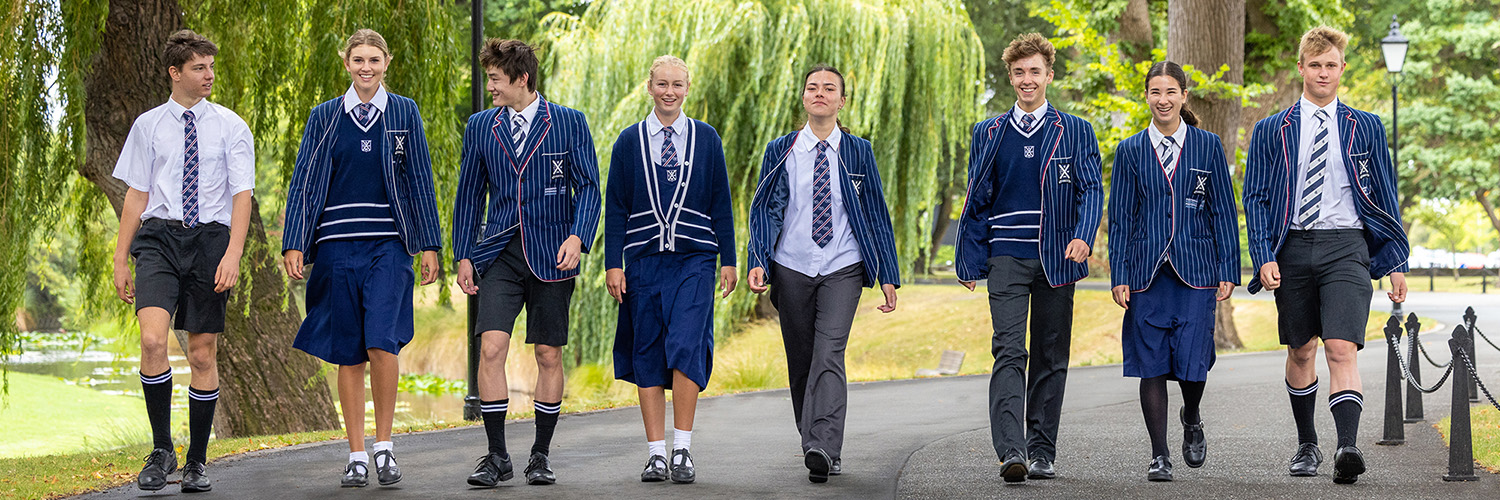
This photo showcases some of the more commonly worn uniform combinations.
All senior students are to have red braid on their blazer and wear the Senior College tie or other approved tie. This identifies them as a member of the Senior College and marks their seniority within the College community.
College uniform is worn at school and when travelling to and from College. Students are required to:
Patterned or coloured T-shirts under school shirts are not permitted. Coloured socks may not be worn.
When travelling with College teams or groups casual clothes may sometimes be approved, but only in special cases such as field trips or Outdoor Education trips.
A final decision on what constitutes good grooming will be made by the Head of Senior College in consultation with the Principal of Secondary School and the Years 12 and 13 Deans.
Female Fit
Male Fit
Non-gendered Items and Accessories
Hair and Grooming
Hair must not be longer than the length of the collar at the back, must fall above the eyebrow line, and should be of even length overall. It should be cut in a conservative style and not shorter than a number three comb. Sideboards must not be lower than the earlobe or wider than 2.5cm. Hairstyles that are deemed to be 'mullets' will not be allowed.
Faces must be clean-shaven.
Long hair must be tied back. Hair jewellery is not acceptable. Ribbons and ties must be blue or white. Scrunchies must be black, navy blue or white.
Hair must be clean and well-groomed, in the range of natural hair colour only and kept clear off the face and above their eyebrows. Unusual hairstyles, including streaking of hair, dreadlocks and braided hair, will not be permitted.
Jewellery
Only young women are able to wear one pair of studs or sleepers in the lobe of the ears. No other rings or studs of any type may be worn by any student. Wristbands, bracelets, finger jewellery, piercings and body art which are visible while wearing the College uniform are not permitted. Christening bracelets require special exemption from the College Chaplain. Cultural tattoos or other culturally significant items of jewellery may be approved by the Head of Secondary School on application by students.
Make-up and Nails Guidelines
Make-up and nail varnish is not part of the College uniform, and it is not to be worn at any time with school uniform or sports uniform.
Uniform Report
If a student wears their uniform incorrectly, or their standard of appearance is below what is expected in the Senior College, they will be placed on uniform report. This means that for a period of five College days, the student must report to the Senior College Office between 8.15am and 8.30am for their uniform and appearance to be checked. If uniform report is not completed in the stipulated time, then there will be an escalation of discipline. Persistent uniform breaches will result in a student being placed on Senior College (Friday) consequence or Saturday detention.
Below is a summarised version of our Student Social Media Guidelines. Please click here to read the guidelines in full.
St Andrew's College recognises the significance of social media in modern society, offering opportunities for students to learn, engage, and communicate. The College aims to implement guidelines to safeguard students' and the College's reputation. The guidelines cover three main sections:
Students are expected to adhere to these guidelines, with disciplinary action for any breaches.
Tutor groups in the Senior College are arranged so that students remain with the same tutor, where possible, throughout their time at St Andrew’s College. There are separate groups in the Senior College for Years 12 and 13 students.
Year group and tutor group meetings are an important part of the communication process, and all students must attend.
Tutors have the initial responsibility for academic and pastoral care of students and meet daily with their students Monday to Thursday (for an extended time) and occasionally on Friday. Tutors will report any academic or pastoral concerns to the Dean of the year group who may then involve the Guidance team if deemed necessary. While the Deans administer many aspects of the year group organisation, they delegate responsibilities to tutors, who will be an important source of information and direction for students. Tutors will be aware of each student’s timetable and options programme, reports, Community Service Award completion, sporting and cultural activities.
If a student has any difficulty in class, or if some aspect of behaviour is called into question, tutors should be informed. Tutors will discuss a student’s grades with them, write comments on reports, assist in ensuring all the requirements of the Senior College Community Service Award are being met, and help with the preparation of their Leaver Profile.
Parents are able to contact a student’s tutor by email, phone or personal visit.
Conferences involving students, parents and tutors will be held three times a year – at the start of the year, the beginning of Term 3, and after school examinations. These conferences are aimed at discussing academic progress, any pastoral care issues, goals for the year and any other relevant matters.
